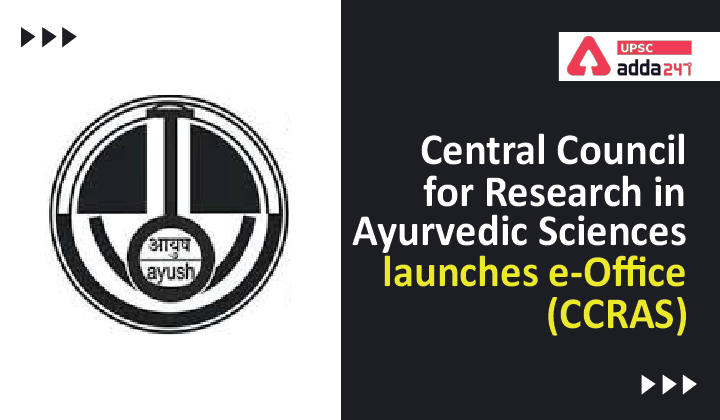


The Central Council for Research in Ayurvedic Sciences (CCRAS) is taking crucial steps towards the global acceptance and integration of traditional medicine. During a national consultative meet, CCRAS signed two MoUs with Shri Krishna Ayush University and Dabur to elevate traditional medicine research to global standards and launched its updated website. The event, organized in collaboration with the World Health Organisation, aims to identify and prioritize key research areas across various traditional medicine systems. The MoUs will foster international collaborations and provide opportunities for research and academic exchanges, while the updated website marks a significant step in modernizing CCRAS's digital presence.
CCRAS Elevates Traditional Medicine Research to Global Standards
The Central Council for Research in Ayurvedic Sciences (CCRAS), a leading Indian research organization dedicated to the field of Ayurvedic medicine, is forging ahead with bold initiatives to enhance the global recognition and integration of traditional medicine.
Background
Ayurveda, a traditional Indian medicinal system with roots stretching back thousands of years, has gained increasing prominence in recent decades due to its holistic approach and emphasis on natural remedies. However, its widespread acceptance and integration into mainstream healthcare have been hindered by challenges related to research and standardization.
Recent Developments
To address these challenges, CCRAS has embarked on a comprehensive plan to elevate traditional medicine research to global standards. At a recent national consultative meet, CCRAS signed two significant Memorandums of Understanding (MoUs):
In addition, CCRAS has launched an updated website designed to showcase its research findings, educational resources, and initiatives to a global audience.
FAQs
1. What is the goal of CCRAS's initiatives?
To enhance the global acceptance and integration of traditional medicine by conducting rigorous research, establishing international collaborations, and providing modern digital platforms.
2. How will the MoUs contribute to research?
The MoUs with SKAU and Dabur will facilitate joint research projects, academic exchanges, and access to cutting-edge technologies, fostering innovation and advancing the scientific understanding of traditional medicine.
3. What is the significance of the updated CCRAS website?
The revamped website provides a comprehensive online resource for information on CCRAS's research, educational programs, and initiatives. It aims to improve accessibility to its scientific findings and promote collaboration with stakeholders worldwide.
4. How does CCRAS involve the World Health Organization?
CCRAS collaborates with the World Health Organization (WHO) in identifying and prioritizing key research areas across various traditional medicine systems. WHO provides guidance and support to ensure alignment with international standards and best practices.
5. What other initiatives is CCRAS pursuing?
CCRAS is actively engaged in research on the efficacy and safety of Ayurvedic medicines, clinical trials, and the development of standardized protocols for traditional medical practices. It also supports the establishment of Ayush Research Institutes and provides training programs for students and practitioners.

A remote monitoring camera operated by the US Geological Survey captured stunning visuals of the recent volcanic eruption at Hawaii's Kilauea Volcano. The footage showed lava fountains up to 100 feet high and the raw power of nature as the lava eventually engulfed the camera. This eruption, known as Episode 38, was the latest in a series of eruptions that have been occurring since December last year. However, according to USGS, another episode could take place in the near future.

Indian Prime Minister Narendra Modi virtually inaugurated Skyroot Aerospace's new Infinity Campus in Hyderabad and unveiled their first orbital launch vehicle, the Vikram-I. During the event, PM Modi praised India's advancements in space technology and spoke about the importance of private companies like Skyroot in driving innovation in the space sector. The Infinity Campus, equipped with state-of-the-art facilities, has the capacity to produce one rocket per month, marking a significant milestone in India's private space manufacturing capability. Skyroot Aerospace, founded by former ISRO engineers, has quickly become a prominent player in India's growing space industry, with the successful launch of Vikram-S, the country's first privately built sub-orbital rocket.

We all experience changes in our mood, whether it's feeling happy and content or irritated and moody. But what are the underlying factors that contribute to these changes? This article from Medindia explores the top 10 things that can affect our mood, from physical health to environmental factors. It also provides tips on how to avoid these mood-altering triggers and maintain a positive state of mind. With a focus on promoting overall well-being, Medindia's policies align with the UN's Sustainable Development Goals, making it a reliable source of information for health and wellness.

A recent report by Public Health Scotland has shown a steep increase in flu cases and hospitalizations in Scotland. The numbers have more than doubled from the previous week, with a higher intensity observed in younger age groups. Experts are warning of a long flu season and a new variant of the illness that is spreading more easily. Health Secretary Neil Gray has assured the public that there are enough doses of flu vaccine available in the country.

The observation of National Pollution Control Day on 2 December serves as a timely reminder of India's struggle with escalating pollution levels. The recent years have seen a sharp increase in toxic particles and hazardous emissions, causing severe health issues and environmental damage. The ongoing pollution emergency calls for more stringent regulations, better urban planning, and increased public engagement to mitigate the crisis.

As World AIDS Day approaches, conversations around HIV prevention in India are becoming more open and informed. In particular, there is growing interest in PrEP (pre-exposure prophylaxis), a medicine that offers strong protection against HIV when used correctly. With rising awareness and more accessible sexual-health services, doctors are seeing a steady rise in patients asking about PrEP as a proactive health choice. This signals a shift towards informed prevention and a stigma-free dialogue surrounding HIV.

ISRO has been making continuous efforts to establish contact with the Vikram lander and Pragyan rover, which were put into sleep mode earlier this month, ahead of the lunar night. However, the prolonged spell of cold weather conditions, reaching up to -150 degrees Celsius, has made it difficult for them to wake up. With the sunrise on the Moon's south polar region and their solar panels believed to be optimally charged now, ISRO is hoping to revive the lander and rover and continue with their experiments and studies. The latest update from ISRO is that the plan to reactivate them has been delayed to September 23 due to the extreme lunar weather conditions.

Monsoon season may bring romantic vibes, but it's also a nightmare for contact lens wearers. Rainwater contains bacteria and pollutants that can cause eye infections, especially when wearing contact lenses. Ophthalmologists recommend using glasses instead and practicing good hygiene to avoid irritation and infection.

India's first human spaceflight mission, Gaganyaan, is one step closer to reality as ISRO successfully tested the main parachutes for the mission's Crew Module. The test, conducted at the Babina Field Firing Range in Uttar Pradesh, is part of the qualification process for the Gaganyaan parachute system. The system, which includes 10 parachutes of different types, is designed to ensure the safe and stable descent of astronauts returning to Earth. This milestone test marks a crucial step forward for India's ambitious space exploration goals.

As World Pneumonia Day is observed on November 12, experts are drawing attention to the dangerous link between air pollution and respiratory illnesses. In India, the post-Diwali smog adds to the already high levels of pollution, increasing the risk of pneumonia, particularly among vulnerable populations. While outdoor air pollution is often blamed, experts emphasize that poor indoor air quality also plays a significant role in triggering and worsening respiratory infections. Health professionals are urging for better air quality regulations and precautions to prevent this deadly connection between pollution and pneumonia.